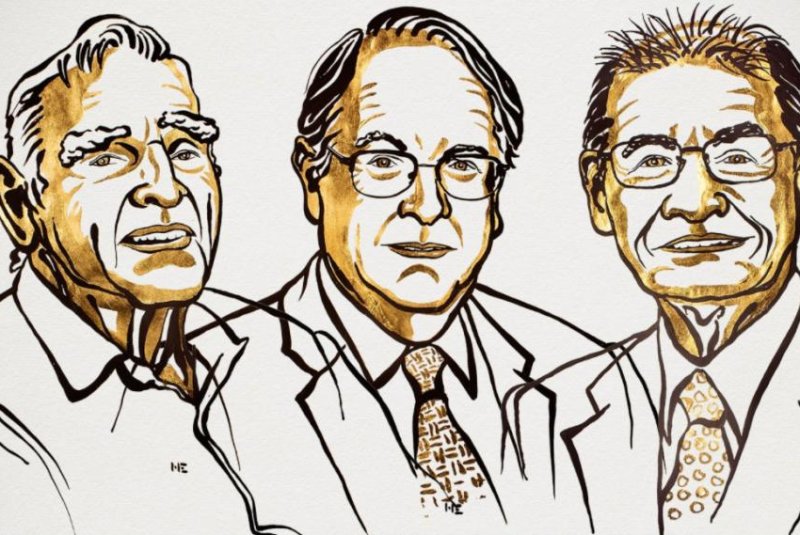1 of 2 | The 2019 Nobel Prize in Chemistry were awarded to John Goodenough, Stanley Whittingham and Akira Yoshino Wednesday for their work developing the lithium ion battery, which has revolutionized modern life and increased environmental sustainability. Illustration by Niklas Elmehed/Nobel Media
Oct. 9 (UPI) -- A trio of American and Japanese scientists won the Nobel Prize for Chemistry Wednesday for their work in developing lithium-ion batteries.
The developers of lithium and lithium ion batteries, John B. Goodenough, M. Stanley Whittingham and Akira Yoshino, were announced as the winners of the 2019 prize in Stockholm by the Royal Swedish Academy of Sciences.
Goodenough is a researcher at the University of Texas, Austin, Whittingham at New York's Binghamton University and Yoshino at Meijo University in Nagoya, Japan.
Whittingham pioneered the first functional lithium battery in the early 1970s, which was found to be too explosive to be viable. By the 1980s, Goodenough had developed lithium-ion batteries with capacity for far greater power. Yoshino took their research and created the first commercially viable lithium-ion battery in 1985 by eliminating the use of pure lithium in favor of lithium ion.
"We have gained access to a technical, truly portable electronics, the batteries no longer weigh tons, they weigh kilograms," chemistry professor Sara Snorgerup Linse said at the ceremony Wednesday.
The shift to lithium-ion batteries can help reduce climate change by shifting the point of pollution from the tailpipe on a traditional gasoline-powered vehicle to a power plant that provides the electricity to charge the batteries on electric cars. Pollution can be managed easier at the power station, the Nobel panelists said.
The batteries can also be used to store energy near solar or wind farms, for distribution when demand is higher.
"This is one of the main pressing issues for mankind to solve," Linse said.
Experts say the batteries' lightweight, high-power storage ability make them ideal for powering everything from laptop computers and mobile devices to electric cars and lawnmowers.
The Nobel Prize for Literature will be awarded Thursday, the Nobel Peace Prize on Friday and the Nobel Prize for Economic Sciences on Monday.















